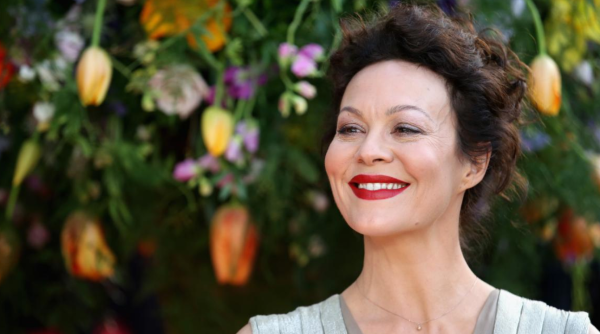She Made the Supremely Difficult Appear Effortless
by Dominic Maxwell | The Times | April 16, 2021

Helen McCrory’s fearlessness made her phenomenally watchable in whatever she did GETTY IMAGES
“You don’t realise how quick life passes you,” Helen McCrory told The Times in an interview in 2017. She was talking about coming relatively late to motherhood. Yet when her husband, Damian Lewis, announced on Twitter today McCrory’s tragically early death, aged 52, from cancer, it was a salutary reminder of how easy it is to take what you’ve got for granted.
It is not just eulogy speak to think of McCrory as one of our very finest actresses. She died as she lived, her husband said, “fearlessly”. It was that fearlessness that made her so phenomenally watchable in whatever she did. On television in
Peaky Blinders or, most recently,
Roadkill. On the big screen in the James Bond film
Skyfall or three
Harry Potter films. On stage in Medea orThe Deep Blue Sea at the National Theatre, or as Olivia in Sam Mendes’s production of Twelfth Night at the Donmar Warehouse. Wherever she turned up, she brought an extraordinary energy and an equally extraordinary ability to apply only as much of that energy as was needed.

With Danny Sapani in Medea at the National Theatre in 2014 REX/SHUTTERSTOCK
So her fearlessness gave her roles the air not of conspicuous daring, but instead of ease. She just nailed it, time and again, whatever was required of her. Whether it was the quiet yet bulletproof power of Polly Gray in all five seasons of Peaky Blinders or the presumptuous disdain of her MP character in Skyfall, smilingly accusing Judi Dench’s M of obsolescence, you didn’t see the gap between her and her character.

In Peaky Blinders ALAMY
Perhaps that’s why, though she was one of the most in-demand actresses of her generation, we didn’t always celebrate quite how good she was. Did being married to an actor even more famous than her to some extent overshadow her extraordinary talent? Or was it also because, like the best performers, she could make supremely difficult things appear effortless?
Yes, she had a natural eccentricity too: in that same Times interview she talked about going to her local in a tiara. She was a natural performer. She owned her opinions. Yet she also insisted that if you are going to dredge up gnarly parts of human despair or sexuality, as she did on stage in her two final theatre roles, the heroine of Euripides’ Medea and Hester Collyer in Terence Rattigan’s The Deep Blue Sea, you need to be in control of those emotions. Her unneurotic parents, she said, made her unneurotic. “Acting is not therapy. There’s nothing worse than an actor using a part as therapy.” So even when her characters lost control, McCrory did not.
McCrory made an impression almost immediately after graduating from the Drama Centre in London. She won best actress at the Manchester Evening News theatre awards for her role in Lorca’s Blood Wedding in 1991, when she was in her early twenties. Stage work kept coming — including a performance as Rosalind in a 1940s-set As You Like It in the West End in 2005, and a role in a less celebrated verse play at the Almeida Theatre in London three years earlier, Five Gold Rings, that introduced her to Lewis — but her versatility and poise ensured that screen work increasingly dominated.

With her husband, Damian Lewis GETTY IMAGES
She had a highly visible start to the century. On Channel 4 in 2000 she was Anna Karenina, opposite Douglas Henshall and Stephen Dillane, and one of the team of barristers in Peter Moffat’s legal drama series North Square. Three years later she starred alongside Rufus Sewell in the four-part Charles II: The Power and the Passion, directed by Joe Wright. She went on to have roles in everything from Doctor Who to Jed Mercurio’s modern-day adaptation of Frankenstein (playing the geneticist Dr Victoria Frankenstein) to playing Narcissa Malfoy in the Harry Potter films — having given her original role of Bellatrix Lestrange to Helena Bonham Carter after getting pregnant with her daughter, Manon.

As Cherie Blair, with Michael Sheen as Tony, on the set of The Queen in 2005 REX/SHUTTERSTOCK
She became the sort of actress you were always glad to see. Playing Cherie Blair to Michael Sheen’s Tony Blair (in The Queen and The Special Relationship), she didn’t have to do much — a shake of the head, an indulgent grin — to offer an adroit sketch of a woman comfortable with being at an angle from the establishment. She came across as the elder stateswoman last year as a Theresa May-like prime minister opposite Hugh Laurie’s Tory rascal in David Hare’s television drama Roadkill. As ever, though, that is what the part asked for. McCrory was an emotionally acute performer who could make you laugh, make you scared or break your heart. Sometimes all at once.
Source: The Times





As a great fan of Homeland and Billions, I’ve first grown to like and appreciate Demian and his great work. Only later I discovered his late spouse and her fantastic roles and philanthropy. I was deeply saddened when I heard the devastating news, and as I was reading Damian’s comments about how lobing, considerate and thankful she was until her last days, I felt the true magnitude of his, and the world’s loss.
My sincere condolences, hoping her legacy will make the whole family live through the hard times, and give them strenght to carry on.💔